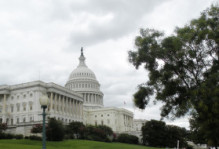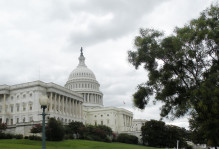A night of Psaki and sliders
Last Friday, my class got to meet a William & Mary star: White House Communications Director Jen Psaki ’00. In the W&M Washington Center, the Reves Center hosted a foreign policy panel discussion with Psaki and a W&M professor and a geospatial scientist affiliated with Aid Data, Ariel BenYishay and Daniel Runfola. Originally intended for big donors only, the powers that be opened the event to W&M alums and students earlier that week.
I almost didn’t go because the event was scheduled right after our usual four hours of guest speakers (which turned out to be two, since one of them cancelled), and I knew I’d be exhausted. But I also knew that if someone asked me why I missed the chance to meet Jen Psaki, exhaustion would not be a good excuse.
After hearing from Ruy Teixeira from the Center for American Progress, we took the elevator down to the lobby and joined a growing crowd of old, suited alums who probably had a very different experience of W&M than we did. We chatted among ourselves until Adam Anthony, Director of the W&M Washington Center, grabbed me by the shoulders and turned me around to face Jen Psaki, who had just arrived. Caught completely off guard, I awkwardly shook her hand – mine completely out of sync with hers – as Adam introduced us. She asked each of us what we were interested in and where we were interning. I didn’t know what to expect from her, but I was struck by her humility and openness. She talked with us until just before the panel began.
While I’m sworn to secrecy on what exactly Psaki and the others said at the panel – it was technically off the record – I’ll share the broad topics they discussed. Psaki spoke about her time in the state department, the influence of Russia in America’s policy toward Syria, and emphasized diplomacy as an undervalued element of foreign policy. She also talked about how President Obama has communicated through non-traditional news sources.
Both professors discussed how government agencies and even other nations have used AidData to help distribute aid more effectively. When someone in the audience suggested that AidData monetize access to its information, BenYishay said that doing so would undercut AidData’s mission, and make it impossible to access critical information during emergencies.
After a round of questions, we split into a reception, which served tasty salmon and veggie burger sliders with remoulade sauce. I spoke with several alums, who shared their post-grad experiences and casually doled out advice. I left that night glad that I convinced myself to go.
-Matt Camarda ’16




No comments.
Comments are currently closed. Comments are closed on all posts older than one year, and for those in our archive.